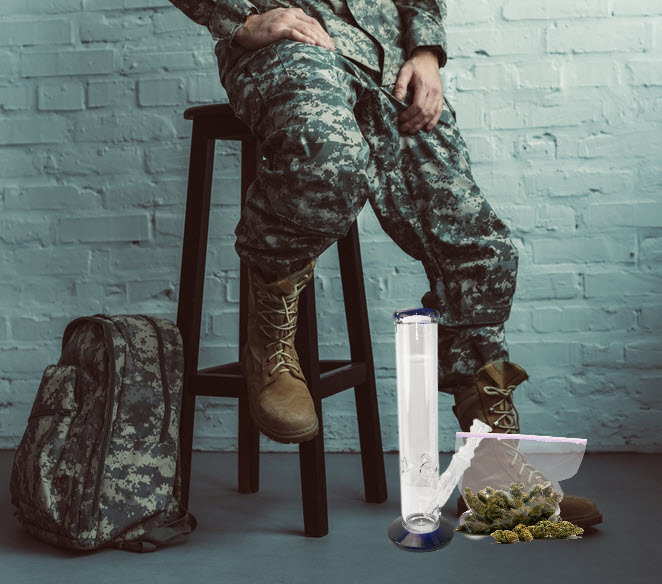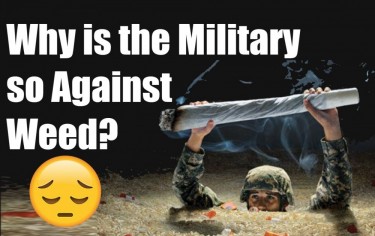
Why the military should have reduced penalties for being caught with cannabis
According to the Research and Development Corporation (RAND), military recruits who make it into the army, even if they have a record of low cannabis use, did not perform worse than other soldiers.
This should be good news for recruiters across the country, considering the majority of new recruits are from states where cannabis is medically legal.
However, cannabis use is still considered a disqualifying offense for hopeful recruits. Now those who gave up long ago can apply for an exemption, which recruits can do if they suffer from illnesses like insomnia or diabetes.
Now there’s new legislation in Congress that would make the consequences for cannabis use or possession among military personnel similar to those of being intoxicated on duty, reports Marijuana Moment. The REFORM (Restoring Equity for Offenses Related to Marijuana) bill, proposed by Rep. Anthony Brown, would make changes to the current Uniform Code of Military Justice so that alcohol and marijuana penalties are similar.
According to the draft law, the punishment for cannabis use would be no worse than “drunk on duty”. Currently, if military personnel are caught for unlawfully possessing up to 30 grams of marijuana, they could face “dishonorable discharge, forfeiture of all salaries and allowances, and two years in prison.” On the other hand, if they are caught weighing over 30 grams, this can exceed the limit of a maximum of five years.
Why the military should be allowed to use cannabis
Military members should be allowed to use cannabis, including off-duty.
Just because they do this on their own time shouldn’t make them vulnerable to dishonorable discharges. Back to the RAND Corporation, there is no conclusive evidence that the legalization of cannabis in the United States has had any impact on the nature of army recruits. “Contrary to expectations, recruits who have been recruited and recruits with a documented history of marijuana or behavioral health problems are not consistently more at risk on all dimensions,” according to its nearly 200-page report on Army waivers. “In some cases, historically, they’re more likely to do better.”
Now, as legalization spreads across the United States, more active-duty soldiers have spoken out about the current policy. According to the American Home Front, Army veteran Matthew Kahl was forced to retire on his second deployment after suffering a serious facial injury, as well as spinal injuries, traumatic brain injuries and post-traumatic stress disorder. Because of this, he had to be given about 20 different medications.
He then moved to Colorado to try medicinal cannabis as an alternative and reports that it worked. Getting off many of the medications one at a time helped him, and eventually he was able to come off all the medications altogether. Now he runs an organization that helps veterans gain legal rights to use medicinal cannabis.
“I know people who are deployed and they often come across hashish in Afghanistan,” he tells American Home Front. “They use hash not only to treat the horrors and hardships of war, but also to relieve boredom,” he says.
Setting the rules for cannabis use is what the government needs to figure out, at least initially. It might be understandable that given that cannabis contains psychoactive THC, and given that it might be worrying to trust a person high while using a firearm, there should at least be off-duty allowances as well. Soldiers can also definitely take advantage of the calming properties of cannabidiol (CBD), which does not get you high; In the field, this can help relieve traumatic stress instantly and help them sleep better to get work done the next day.
That hasn’t stopped members from fighting for what they believe to be right.
In 2020, the House Armed Services Committee approved a $740.5 billion defense bill that included a provision that said it would allow ex-troops a one-time waiver of reinstatement if they admit to cannabis use. Rep. Ruben Gallego’s proposal says military members who eventually detach from the Army and wish to re-enlist in the future can apply for a waiver if they admit to cannabis use, although this is done on a case-by-case basis, reports Military.com .
“Just smoking weed shouldn’t stop a patriotic American from fighting for our country,” Gallego said in a press release. “We finally need to exercise some common sense when it comes to our marijuana policy, and I’m glad my amendment will lead us in that direction.”
He’s proposed this idea every year since 2018, and it was eventually adopted that same year.
He’s not the only one, and it won’t be the last, that changes in military law will be promoted there.
Also, it’s just unfair that even medical marijuana would be off-limits to army recruits, even if they have MMJ cards issued by doctors for health problems. Conversely, when veterans seek help from the US Veterans Administration, they are not denied benefits because of their cannabis use—in fact, they are encouraged to speak to their VA providers about marijuana use. “VA healthcare providers will record marijuana use in the veteran’s VA medical record to have the information available when planning treatment. Like all clinical information, this is part of the confidential medical record and is protected by laws and regulations designed to protect patient privacy and confidentiality,” the VA said on its website.
Hopefully we see more changes to help active duty soldiers maximize their cannabis use.
THE MILITARY ON LEGALIZATION, READ MORE…

WHY IS THE MILITARY SO AGAINST WEED? WE ASKED!
OR..

WHY VETERANS WANT MORE MEDICAL MARIJUANA RESEARCH!

Post a comment: